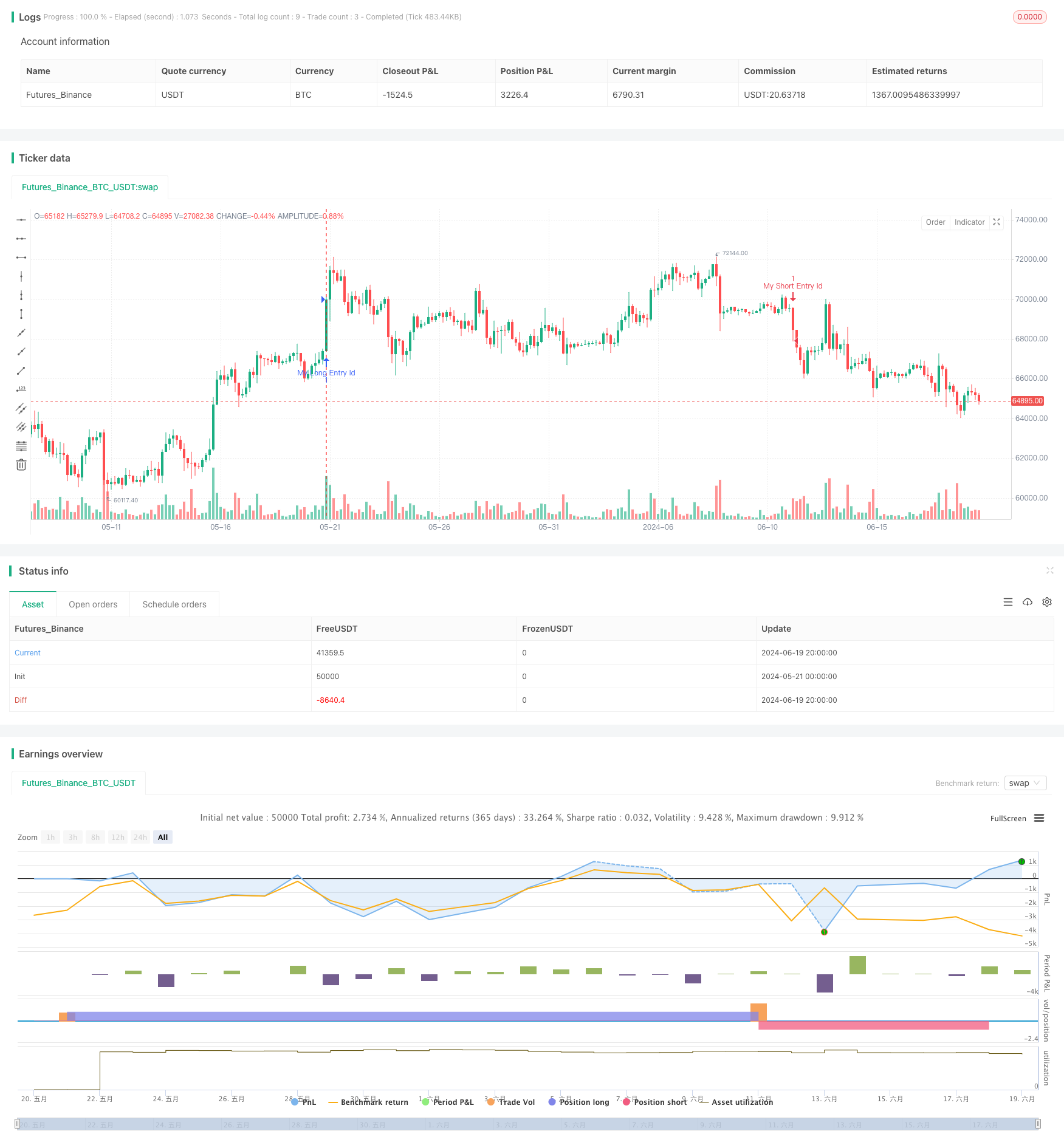
概述
这是一个基于双重Supertrend指标的多步移动止盈策略。该策略利用两个参数不同的Supertrend指标来判断市场趋势,并根据趋势方向进行多空交易。策略的核心在于采用多步移动止盈机制,通过设置多个止盈目标来逐步锁定利润,同时保留部分仓位以把握更大的行情。这种方法既能降低风险,又能最大化盈利潜力。
策略原理
双重Supertrend指标:策略使用两个参数设置不同的Supertrend指标来判断趋势。当两个指标同时显示上升趋势时,触发做多信号;当两个指标同时显示下降趋势时,触发做空信号。这种双重确认机制可以有效减少假信号。
多步移动止盈:策略设置了4个可调节的止盈目标。每个目标都有相应的止盈百分比和平仓比例。例如,第一个止盈目标可能设置为6%利润时平掉12%的仓位,第二个目标可能是12%利润时平掉8%的仓位,以此类推。这种机制既能逐步锁定利润,又能让部分仓位继续享受行情。
灵活的交易方向:策略允许用户选择只做多、只做空或双向交易,以适应不同的市场环境和交易偏好。
动态止损:虽然代码中没有明确的止损设置,但策略会在Supertrend指标反转时自动平仓,这实际上起到了动态止损的作用。
策略优势
风险管理优化:多步移动止盈机制大大改善了策略的风险收益比。通过逐步锁定利润,策略可以在保留上涨空间的同时降低回撤风险。
减少假信号:双重Supertrend指标的使用显著降低了假信号的影响,提高了交易的准确性和可靠性。
适应性强:策略可以根据用户偏好和市场状况灵活调整交易方向和止盈参数,适用于各种交易品种和时间周期。
自动化程度高:策略完全自动化,从入场、止盈到出场都无需人工干预,大大降低了情绪影响和操作失误的可能性。
资金管理灵活:通过设置不同的止盈比例,策略可以实现灵活的资金管理,既能保证快速锁定部分利润,又能让剩余仓位继续获利。
策略风险
参数敏感性:策略的性能很大程度上依赖于Supertrend指标和止盈参数的设置。不恰当的参数可能导致过度交易或错过重要机会。
趋势依赖:作为一个趋势跟踪策略,在震荡市场中可能会频繁进出,造成不必要的交易成本。
滑点风险:在快速行情中,多步止盈的执行可能受到滑点影响,实际执行价格可能与预期有所偏差。
过度优化风险:策略有多个可调参数,容易陷入过度优化的陷阱,导致回测结果与实盘表现差异较大。
策略优化方向
引入波动率过滤:考虑结合ATR或其他波动率指标,在低波动率期间减少交易频率,提高策略在不同市场环境下的适应性。
动态参数调整:可以探索使用自适应算法动态调整Supertrend参数和止盈目标,以更好地适应市场变化。
增加止损机制:虽然Supertrend反转提供了一定的止损功能,但可以考虑添加更灵活的止损机制,如跟踪止损,进一步控制风险。
结合其他技术指标:可以考虑引入RSI、MACD等其他技术指标,通过多指标共振来提高入场和出场的准确性。
优化资金管理:可以探索更复杂的资金管理策略,如根据账户盈利情况动态调整仓位大小,以更好地平衡风险和收益。
回测优化:进行更全面的回测,包括不同时间周期、不同市场条件下的表现分析,以找出策略的最佳应用场景和参数设置。
总结
该多步移动止盈策略基于双重Supertrend指标,通过灵活的多步止盈机制实现了风险和收益的平衡。策略的主要优势在于其优秀的风险管理能力和对趋势的敏感度。然而,用户在应用时需要注意参数设置和市场环境的影响。通过进一步优化和完善,该策略有潜力成为一个稳健可靠的自动化交易系统。在实际应用中,建议traders进行充分的回测和模拟交易,并根据具体的交易品种和市场状况进行适当的参数调整。
/*backtest
start: 2024-05-21 00:00:00
end: 2024-06-20 00:00:00
period: 4h
basePeriod: 15m
exchanges: [{"eid":"Futures_Binance","currency":"BTC_USDT"}]
*/
//@version=5
strategy("Strategic Multi-Step Supertrend Trader - Strategy [presentTrading]", overlay=true )
// this strategy utilizes a double Supertrend indicator to determine entry and exit conditions for both long and short trades, with user-configurable take profit levels and trade direction settings.
// The strategy dynamically updates highest and lowest prices during trades and exits positions based on multi-step profit targets or opposing Supertrend signals.
// User inputs for take profit settings
// Grouping Take Profit settings
useTakeProfit = input.bool(true, title="Use Take Profit", group="Take Profit Settings")
takeProfitPercent1 = input.float(6.0, title="Take Profit % Step 1", group="Take Profit Settings")
takeProfitPercent2 = input.float(12.0, title="Take Profit % Step 2", group="Take Profit Settings")
takeProfitPercent3 = input.float(18.0, title="Take Profit % Step 3", group="Take Profit Settings")
takeProfitPercent4 = input.float(50.0, title="Take Profit % Step 4", group="Take Profit Settings")
takeProfitAmount1 = input.float(12, title="Take Profit Amount % Step 1", group="Take Profit Settings")
takeProfitAmount2 = input.float(8, title="Take Profit Amount % Step 2", group="Take Profit Settings")
takeProfitAmount3 = input.float(4, title="Take Profit Amount % Step 3", group="Take Profit Settings")
takeProfitAmount4 = input.float(0, title="Take Profit Amount % Step 4", group="Take Profit Settings")
numberOfSteps = input.int(3, title="Number of Take Profit Steps", minval=1, maxval=4, group="Take Profit Settings")
// Grouping Trade Direction
tradeDirection = input.string("Both", title="Trade Direction", options=["Long", "Short", "Both"], group="Trade Direction")
// Grouping Supertrend settings
atrPeriod1 = input(10, title="ATR Length for Supertrend 1", group="Supertrend Settings")
factor1 = input.float(3.0, title="Factor for Supertrend 1", step=0.01, group="Supertrend Settings")
atrPeriod2 = input(5, title="ATR Length for Supertrend 2", group="Supertrend Settings")
factor2 = input.float(4.0, title="Factor for Supertrend 2", step=0.01, group="Supertrend Settings")
// Function to calculate Supertrend
supertrend(factor, atrPeriod) =>
[a, direction] = ta.supertrend(factor, atrPeriod)
direction
// Calculate Double Supertrend
supertrend1 = supertrend(factor1, atrPeriod1)
supertrend2 = supertrend(factor2, atrPeriod2)
// Entry conditions
longCondition = (supertrend1 < 0 and supertrend2 < 0) and (tradeDirection == "Long" or tradeDirection == "Both")
shortCondition = (supertrend1 > 0 and supertrend2 > 0) and (tradeDirection == "Short" or tradeDirection == "Both")
// Exit conditions
longExitCondition = (supertrend1 > 0 and supertrend2 > 0) and (tradeDirection == "Long" or tradeDirection == "Both")
shortExitCondition = (supertrend1 < 0 and supertrend2 < 0) and (tradeDirection == "Short" or tradeDirection == "Both")
// Variables to store the highest and lowest prices during the trade
var float highestPrice = na
var float lowestPrice = na
// Get the entry price from open trades
entryPrice = strategy.opentrades.entry_price(strategy.opentrades - 1)
// Reset highestPrice or lowestPrice when entering new trades
if (longCondition and strategy.position_size <= 0)
highestPrice := na // Reset the highest price
strategy.entry("My Long Entry Id", strategy.long) // Enter long position
strategy.close("My Short Entry Id", "Short Exit") // Close short position if any
if (shortCondition and strategy.position_size >= 0)
lowestPrice := na // Reset the lowest price
strategy.entry("My Short Entry Id", strategy.short) // Enter short position
strategy.close("My Long Entry Id", "Long Exit") // Close long position if any
// Exit trades based on conditions
if (longExitCondition and strategy.position_size > 0)
strategy.close("My Long Entry Id", "Long Exit") // Exit long position
if (shortExitCondition and strategy.position_size < 0)
strategy.close("My Short Entry Id", "Short Exit") // Exit short position
if (strategy.position_size > 0)
// Update the highest price for long positions
highestPrice := na(highestPrice) ? high : math.max(highestPrice, high)
// Step 1
if (useTakeProfit and numberOfSteps >= 1)
strategy.exit("Take Profit 1", from_entry="My Long Entry Id", qty_percent=takeProfitAmount1, limit=entryPrice * (1 + takeProfitPercent1 / 100))
// Step 2
if (useTakeProfit and numberOfSteps >= 2)
strategy.exit("Take Profit 2", from_entry="My Long Entry Id", qty_percent=takeProfitAmount2, limit=entryPrice * (1 + takeProfitPercent2 / 100))
// Step 3
if (useTakeProfit and numberOfSteps >= 3)
strategy.exit("Take Profit 3", from_entry="My Long Entry Id", qty_percent=takeProfitAmount3, limit=entryPrice * (1 + takeProfitPercent3 / 100))
// Step 4
if (useTakeProfit and numberOfSteps == 4)
strategy.exit("Take Profit 4", from_entry="My Long Entry Id", qty_percent=takeProfitAmount4, limit=entryPrice * (1 + takeProfitPercent4 / 100))
if (strategy.position_size < 0)
// Update the lowest price for short positions
lowestPrice := na(lowestPrice) ? low : math.min(lowestPrice, low)
// Step 1
if (useTakeProfit and numberOfSteps >= 1)
strategy.exit("Take Profit 1", from_entry="My Short Entry Id", qty_percent=takeProfitAmount1, limit=entryPrice * (1 - takeProfitPercent1 / 100))
// Step 2
if (useTakeProfit and numberOfSteps >= 2)
strategy.exit("Take Profit 2", from_entry="My Short Entry Id", qty_percent=takeProfitAmount2, limit=entryPrice * (1 - takeProfitPercent2 / 100))
// Step 3
if (useTakeProfit and numberOfSteps >= 3)
strategy.exit("Take Profit 3", from_entry="My Short Entry Id", qty_percent=takeProfitAmount3, limit=entryPrice * (1 - takeProfitPercent3 / 100))
// Step 4
if (useTakeProfit and numberOfSteps == 4)
strategy.exit("Take Profit 4", from_entry="My Short Entry Id", qty_percent=takeProfitAmount4, limit=entryPrice * (1 - takeProfitPercent4 / 100))